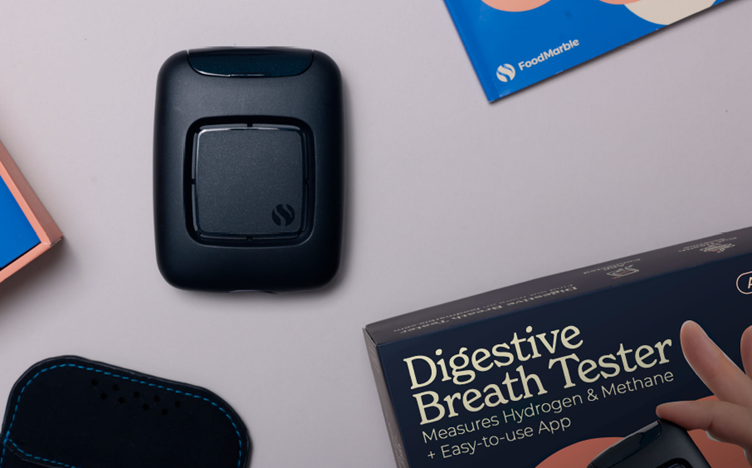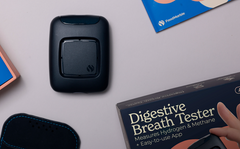
Diagnosing SIBO with FoodMarble
The IBS-SIBO Solution - the one-stop-shop to diagnose, treat & beat SIBO
- SIBO diagnosis from one of our medical Doctors
- Fast results within 3-4 working days
- Detailed instructions on preparing for your test (online videos)
- Online access to SIBO masterclass
- Fully regulated (CQC registered)
The fastest way to test for SIBO
- Purchase your FoodMarble AIRE2 and diagnosis
- Link your FoodMarble account to humanpeople
- Complete the gut health assessment in the email we send to you
We will provide a diagnosis and treatment recommendations.
1. Diagnosis
Buy your SIBO diagnosis today along with access to the first stage of The IBS-SIBO Solution course.

SIBO Test + Diagnosis
£249.00
INCLUDES FOODMARBLE DEVICE
FoodMarble AIRE2 home breath testing device
3-4 day diagnosis from a medical Doctor
Treatment recommendation for your type of SIBO
Access the first part of The IBS-SIBO Solution course: understanding SIBO, treatment and diagnosis
Couldn't load pickup availability

FoodMarble Owners' Diagnosis
£79.00
FOODMARBLE DEVICE REQUIRED
For current FoodMarble AIRE2 owners, get a Doctor to review your results and give a clinical diagnosis
3-4 day diagnosis from a medical Doctor
Treatment recommendation for your type of SIBO
Access the first part of The IBS-SIBO Solution course: understanding SIBO, treatment and diagnosis
Couldn't load pickup availability
SIBO is the #1 cause of IBS
Had gas and bloating for years? Think it's just normal?
Think again.

Get free access to our SIBO Masterclass AND advice if a SIBO test is right for you
SIBO is a common condition, but poorly understood and often mis-diagnosed.
Take our 30-second quiz to unlock our free SIBO Masterclass, in which Dr Geoff Mullan explains what SIBO is, as well as its causes, symptoms, and how best to treat SIBO.
At the end of the quiz and having analysed your symptoms, we will advise if testing for SIBO is right for you.
Introducing The IBS-SIBO Solution
-
We will help you to:
- Enjoy food again
- Get rid of toxic bloat
- Say goodbye to brain fog
- Avoid recurrence of SIBO
- Feel body-confident
- Get your energy back
- Feel yourself again!
-
By giving you:
- Fast diagnosis from the comfort of your home
- Treatment plan tailored to your type of SIBO
- Antimicrobial or antibiotic treatment options
- Step-by-step guidance with our online course (>30 videos)
- Weekly online group sessions with expert nutritionists
- Detailed nutritional guidance and video recipes
Beating SIBO can be life-changing
"I’ve already lost about 6kg of what I would describe as toxic bloat that I’ve been unable to shift the last 2 years!! So physically I feel back to my healthy/happy size!!
Overall, feeling SO much better and just so so grateful for your gut health program" - EV, London UK.
Step 1: diagnose SIBO - quick & easy
The fastest way to diagnose SIBO in days not weeks. SIBO diagnosis
involves analysing hydrogen and methane in the breath. Breath testing is
done at home with aBluetooth-enabledd device. We
then review your results and give you a diagnosis of your type of SIBO.
Your clinical SIBO diagnosis requires a CQC-registered Doctor to review your result along with a detailed health assesment.
Collapsible content
How does the device work?
Watch the video to see how you can easily diagnose SIBO from home. No failed tests. Our regulated medical team will review your results and give you your diagnosis within just 3 working days. Most companies take 2-3 weeks to do this.
The Aire 2 device connects to your phone. Download the (blue) FoodMarble app and follow the instructions in the video.
To do a lactulose challenge test you will need to to share your
clinical data with us. You do this by accepting a request which will be emailed to you.
Can I do multiple tests?
Yes. It is important to retest after treatment is complete. You save a lot of money by using the FoodMarble device.
When you buy the FoodMarble device it includes one doctor review and diagnosis. If you also sign up for The IBS-SIBO Solution (either the
online course or treatment) we will review up to three tests at no extra cost.
Can I test for other food intolerances?
Yes. When you get your SIBO diagnosis from humanpeople the Aire 2 is yours to keep. It can be used for more than just SIBO testing – you can also use it to test for other food intolerances at no extra charge. You will need to order the FoodMarble food intolerance kit to do this.
How much does it cost?
The process of diagnosing SIBO includes:
- Supply of your FoodMarble Aire 2 device, which is yours to keep.
- Access to the online material to help you understand SIBO, its causes and symptoms.
- Review of your gut health questionnaire along with your test results.
- These will then be reviewed by a nutritionist and a medical Doctor.
- We will then supply you with a formal diagnosis on your type of SIBO for up to three tests at no extra cost.
- Your SIBO result is NOT available directly on the FoodMarble app. It will be available on your humanpeople dashboard.
- You will get access to videos to help you understand your type of SIBO.
- You will get advice on the next steps on how to treat your SIBO.
The total cost for all of this is £249.
Where can I read more about SIBO?
- You can read more about The IBS-SIBO Solution here.
- You can read more about SIBO types and the effect of SIBO on rosacea here.
Is the test easy to do?
Yes. It is a simple breath-testing device and can be done from home. Watch the video to see how simple it is to do.
Do I need to be careful about what I eat before doing the SIBO test?
Yes. An important part of the test is to avoid certain foods. See 1:32 on the video.
Preparation for your SIBO test (1:30)
24 hours beforehand: No alcohol.
YES: plain foods meat, fish, eggs, firm tofu and white rice are fine
NO: Onions, garlic, beans & pulses, high lactose dairy, soft drinks and grains
1 hour before test
YES: Clean your teeth but no mouthwash
NO: Mouthwash, smoking, exercise during or before test
Step 2: Treat SIBO - "Remove" Phase
The "remove" or "kill" phase
First we need to remove the bacteria from the small intestine.
Collapsible content
What is the remove/kill phase?
The kill or remove stage involves removing the excess bacteria in the small intestine.
As SIBO has often been present for years this can take time. This
phase lasts 2-4 weeks and requires strong therapeutics to kill off the microbes that have become established there.
What is the best way to get rid of SIBO?
Over the last seven years I have treated hundreds of patients who have SIBO. These are the key things you need to do to treat SIBO effectively.
- Don’t try to do it yourself. Get professional assistance to guide
your through treatment. No two patients are the same and problems often
crop up. - Get a support group who understands your problems. When things are tough they will help support you through treatment.
- This is probably the most important: when you have killed off the
bacteria the work is only halfway done. You need to restore normal
function in the gut to build up your defences or else it will return. - A multidisciplinary approach is essential. The nutrition element is
vital to a successful treatment. If you ignore this your treatment is
likely to fail. - Be patient and ask questions.
- Your treatment protocol needs to have detoxification support. That
means glutathione and if needed treatment to avoid constipation.
Otherwise you will get horrible die-off symptoms. - Build up your treatment slowly to avoid side effects.
- Heal your gut after the initial kill phase.
Dr Geoff Mullan, Chief Medical Officer
How long does the kill phase last?
There are two recognised ways of removing the microbes causing SIBO. Many clinical studies have been done looking at the effectiveness.
In our combined 30 years of experience we find that a longer
treatment period of 3-4 weeks with herbal antimicrobials is the most effective way. There are fewer side effects and better resolution.
However, we do also offer the option to be prescribed antibiotics
which will require a 1:1 consultation with one of our medical team (not included in the price of the treatment course).
What about nutritional advice?
Following a specific guided diet is essential in resolving SIBO. We will recommend a specific diet and guide you with exactly what you need to do during the remove phase.
You will have videos explaining what you need to do along with
cooking videos and recipes so you can still enjoy your food with minimal symptoms.
How do I speak to one of the team?
Every week we will hold a live webinar, which you can join and have all of your questions answered.
These sessions will be held by one of the team who will have access to all of your questionnaires and results.
Doing this in a group has multiple advantages:
- Research has shown that treating in groups improves the overall outcomes. Not only do you get your questions answered but you will also gain really helpful insights and solutions from others. This is included in the course and we strongly encourage you to join.
- You will also be given access to the private SIBO group where you
can ask questions and one of the team will answer these. You can also see previous questions and answers.
Can I book a 1:1 consultation?
Everything you need will be available online in your course materials, live webinars and community.
However, if you want to speak to one of the team face to face you can organise a separate consultation to that from inside the course. There is an additional charge for 1:1 consultations, unless you buy the Ultimate package, which includes two 1:1 consultations.
Can I just do the treatment myself?
Life is all about choices, but there are good choices and bad choices, especially when it comes to health.
We strongly recommend not doing it yourself. A significant proportion of the people we have treated for SIBO are those whose SIBO has recurred after they tried to treat it themselves.
With the DIY option, people often end up spending significant time and money only for SIBO to recur.
How much does this cost?
The cost of a herbal antibiotics treatment is £179.
Step 3: Treat SIBO -"Restore" Phase
The “restore” phase to heal your gut and stop recurrence
Dr Geoff Mullan explains the importance of the restore phase and gives insight into how we do this. The most common cause of recurrence is a failure to heal the gut and restore normal function.
Collapsible content
What is the restore phase?
During the restore phase you will have a number of things provided to
you that will help your gut to heal and restore normal function:
- You will start to reintroduce foods to get back to a normal diet. We will show you how to do this.
- Specific supplements to support normal digestion, normalise your
immune reaction, reduce leaky gut and help get you back to a normal
diet.
What happens if I don't do the restore phase?
When we have removed the microbes from the small intestine we have put out the fire.
However, significant damage has been done and the body needs to
support to speed up the healing process and stop that fire recurring.
Will I need a prokinetic after the kill phase?
Yes! It's important to get things moving again through the digestive system.
This is a key way to stop recurrence. A prokinetic will help normal contraction of the small intestine, which is key to stopping recurrence.
Our proprietary ginger and artichoke blend is a gentle way of doing this.
We will also sometimes use resolor/ prucalopride. Prokinetic agents are taken at night on an empty stomach to make sure no food remnants remain in the small intestine allowing unwanted microbes to regrow.
Depending on the underlying cause of your SIBO, it may be necessary to continue with prokinetics for several months, or in some cases longer.
Will I have to stay on a restricted diet?
No. If your gut health is fully restored then it is very likely that
foods that used to cause problems will no longer be an issue.
However, that is why we are careful about the reintroduction of foods. It needs to be done slowly and methodically. Our online course guides you through this step-by-step.
Sometimes there may still be one or two foods that you struggle with. In these cases, you may need to be careful with your intake over a longer period of time.
How much does this cost?
Access to step-by-step support for the restore phase (SIBO treatment - Part 2) is included in the price for full access to The IBS-SIBO Solution.
The gut-healing supplements for the restore phase are charged separately.
Please refer to the pricing section lower down this page for full details.
You can read more about the gut-healing restore phase supplement protocol here.
Can I book a 1:1 consultation?
Everything you need will be available online in your course materials, live webinars and community.
However, if you want to speak to one of the team face-to-face you can organise a separate consultation from inside the course. There is an additional charge for 1:1 consultations, unless you buy the Ultimate package, which includes two 1:1 consultations.
2. Course- nutrition, support and online health programme
The IBS-SIBO Solution online course - choose the option which best suits you.

Comprehensive
£97.00
EACH MONTH FOR THREE MONTHS
Full access to The IBS-SIBO Solution online health programme
All you need to know to beat SIBO
Over 40 videos
Detailed medical and nutrition information
Access to the private community group
Access to live weekly group sessions and online support
Couldn't load pickup availability

Ultimate
£190.00
EACH MONTH FOR THREE MONTHS
Full access to The IBS-SIBO Solution online health programme
All you need to know to beat SIBO
Over 40 videos
Detailed medical and nutrition information
Access to the private community group
Access to live weekly group sessions and online support
2x 40 minute 1:1 nutritionist consultations
Couldn't load pickup availability
3. SIBO Treatment Options
Our medical team will have recommended a treatment protocol suitable to your type of SIBO. Only order treatment if you know which option is right for your type of SIBO.

Hysbiocide and Gut Heal Protocol
£104.70
EACH MONTH FOR THREE MONTHS
For hydrogen-positive SIBO diagnosis
4 Weeks Hysbiocide
8 Weeks Gut Heal Protocol
Titrated dosages
Premade daily packs
Biofilm disruptors
Glutathione & detox support
Motility agents
Read more...
Couldn't load pickup availability

Metbiocide and Gut heal Protocol
£104.70
EACH MONTH FOR THREE MONTHS
For methane-positive SIBO diagnosis
4 Weeks Metbiocide
8 Weeks Gut Heal Protocol
Titrated dosages
Premade daily packs
Biofilm disruptors
Glutathione & detox support
Motility agents
Read more...
Couldn't load pickup availability

The IBS-SIBO Solution
This course is provided by UK-qualified Doctors and registered nutritionists.
humanpeople is registered with the Care Quality Commission (CQC).
Brought to you by professionals you can trust.
FAQs
What are the first signs of SIBO?
The most common sign of SIBO is bloating after eating. If this occurs regularly after eating foods with a high fibre content you may have SIBO. Typically bloating occurs within 30 minutes of eating.
Does SIBO cause weight gain?
Patients with Small Intestinal Bacterial Overgrowth (SIBO) often lose weight after treatment for a few reasons:
- Malabsorption: SIBO can lead to malabsorption of nutrients in the food you eat, which may result in weight loss. As the treatment helps to rebalance the gut microbiota, absorption processes return to normal.
- Reduction in inflammation and bloating: With effective treatment, the inflammation and bloating often associated with SIBO decreases. While this isn’t actual weight loss, it can lead to a decrease in body size and potentially a decrease in weight, especially if the bloating and inflammation were severe. Most patients notice that they can fit into clothes that had previously been too tight.
- Changes in appetite and dietary habits: The discomfort and bloating that come with SIBO leads many people to eat less, while others may eat more in an attempt to alleviate their symptoms. Once the SIBO is treated, appetite returns to normal, and with it a more balanced healthy diet.
- Changes in gut bacteria: The bacteria in our gut can influence our metabolism and how we store fat. By treating SIBO and altering the composition of the gut microbiota, this is probably another reason for an impact on a person’s weight.
Does SIBO cause weight loss?
Yes. Small Intestinal Bacterial Overgrowth (SIBO) can lead to weight loss. This happens because the excess bacteria in the small intestine can interfere with the normal digestion and absorption of food, which might result in malnutrition and weight loss. The bacteria can consume some of the nutrients that your body would normally absorb, further contributing to weight loss. Additionally, the discomfort caused by SIBO can also lead to a decrease in appetite in some individuals, which might result in reduced food intake and weight loss.
Does SIBO cause inflammation?
Yes. Small Intestinal Bacterial Overgrowth (SIBO) can indeed cause inflammation. The overgrowth of bacteria in the small intestine can lead to an increased production of gases and other byproducts that irritate the lining of the intestines. This can result in an inflammatory response, leading to symptoms like pain, bloating, and alterations in bowel movements.
Moreover, the bacteria can potentially damage the lining of the small intestine, leading to increased intestinal permeability, often referred to as “leaky gut”. This condition allows bacteria and their toxins, as well as partially digested food, to escape from the intestines into the bloodstream, which can trigger a systemic inflammatory response in the body.
SIBO is not just a condition that causes discomfort and altered bowel movements, but it can also lead to more serious health problems if left untreated.
Does SIBO cause brain fog?
Yes. Small Intestinal Bacterial Overgrowth (SIBO) does lead to symptoms of brain fog, which might include poor concentration, confusion, and a lack of mental clarity. The exact mechanisms aren’t fully understood, but the current understanding is:
- Nutrient malabsorption: SIBO can lead to malabsorption of vital nutrients due to bacterial overgrowth in the small intestine. This lack of nutrients, such as B vitamins which are crucial for neurological function, may contribute to brain fog.
- Gut-brain axis: The gut and the brain communicate closely through the gut-brain axis. Changes in the gut microbiota (as occurs in SIBO) can influence brain function through this axis, potentially leading to symptoms such as brain fog.
- Inflammation and “leaky gut”: SIBO can lead to inflammation and increased intestinal permeability, often referred to as “leaky gut”. This allows toxins, bacteria, and other particles to enter the bloodstream, which may trigger an immune response and systemic inflammation. This inflammation can affect the brain and lead to symptoms of brain fog.
- Production of toxins: Overgrown bacteria in the gut can produce harmful substances (endotoxins) that can enter the bloodstream and affect the brain, leading to symptoms of brain fog.
What does SIBO look like in stool?
- Diarrhoea: Diarrhoea often occurs in individuals with SIBO, leading to loose or watery stools.
- Malabsorption: If SIBO is severe, it can result in malabsorption, leading to pale, oily, or unusually smelly stools due to unabsorbed fats. This condition is known as steatorrhoea.
- Constipation: Some people with SIBO experience constipation, which can sometimes alternate with periods of diarrhoea.
- Floating stools: High gas content or malabsorption can cause the stools of people with SIBO to float.
- Changes in colour: Although not specific to SIBO, changes in stool colour can occur with various digestive disorder
Does SIBO cause bad breath?
Yes. Small Intestinal Bacterial Overgrowth (SIBO) can potentially contribute to symptoms of acid reflux, also known as gastro-oesophageal reflux disease (GORD).
The overgrowth of bacteria in the small intestine linked with SIBO can lead to increased production of gas. This excess gas may increase pressure within the abdomen, potentially forcing stomach acid upwards into the oesophagus, causing symptoms of acid reflux.
Additionally, the bacteria can interfere with the correct functioning of the muscles controlling the movement of food through the gastrointestinal tract, including the lower oesophageal sphincter. This sphincter acts as a barrier to prevent backflow of stomach acid. If its function is compromised, it could result in acid reflux.
Furthermore, SIBO can cause inflammation and damage to the gut lining, which could indirectly affect the functioning of the gastrointestinal tract, potentially contributing to acid reflux.
It’s important to note acid reflux can result from many other factors as well, including diet, certain medications, obesity, and other medical conditions.
What does having SIBO feel like?
Having Small Intestinal Bacterial Overgrowth (SIBO) can result in a variety of symptoms that can greatly affect a person’s quality of life. Here’s what having SIBO might feel like:
- Abdominal discomfort or pain: This is often described as a cramping sensation or a feeling of pressure in the abdomen. It might get worse after meals.
- Bloating and swelling: Many people with SIBO experience bloating, which can lead to a feeling of fullness or swelling in the abdomen.
- Changes in bowel movements: This could include diarrhoea, constipation, or a mixture of both. Some individuals might notice changes in the colour, consistency, or frequency of their bowel movements.
- Fatigue: Feeling tired or having low energy is common with SIBO, possibly due to the body’s effort to cope with the infection or resulting from nutrient malabsorption.
- Gas and belching: An overgrowth of bacteria in the small intestine can produce excess gas, leading to frequent passing of wind or belching.
- Nausea or loss of appetite: Some individuals might feel nauseated or have a reduced appetite, possibly due to the discomfort or bloating after eating.
- Weight loss: Despite eating normally, some people with SIBO might lose weight, usually due to malabsorption of nutrients.
- Symptoms beyond the gut: Some people may also experience symptoms beyond the gut such as brain fog, joint pain, skin issues like rashes or rosacea, and other systemic symptoms.
Is SIBO linked to fibromyalgia?
Research suggests there may be a link between Small Intestinal Bacterial Overgrowth (SIBO) and fibromyalgia. Both conditions involve chronic pain, and studies have shown that a higher-than-average percentage of individuals with fibromyalgia test positive for SIBO.
Fibromyalgia is a complex disorder characterized by widespread muscle pain, fatigue, and tenderness in localized areas. The cause of fibromyalgia is still not completely understood, but it is thought to involve a variety of genetic, environmental, and psychological factors.
SIBO, on the other hand, involves an excessive amount of bacteria in the small intestine. This can lead to malabsorption of nutrients, bloating, and abdominal pain.
The connection between the two conditions may be due to several factors:
- Gut-brain axis: The gut and the brain communicate closely through what is known as the gut-brain axis. Changes in the gut microbiota (as occurs in SIBO) can influence brain function and the perception of pain.
- Inflammation: Both SIBO and fibromyalgia have been linked to increased levels of inflammation in the body. In SIBO, the inflammation occurs due to bacterial overgrowth, whereas in fibromyalgia, the inflammation may be a result of a heightened immune response.
- Altered pain perception: Some research suggests that individuals with SIBO may have an increased perception of pain, which could contribute to the pain experienced in fibromyalgia.




